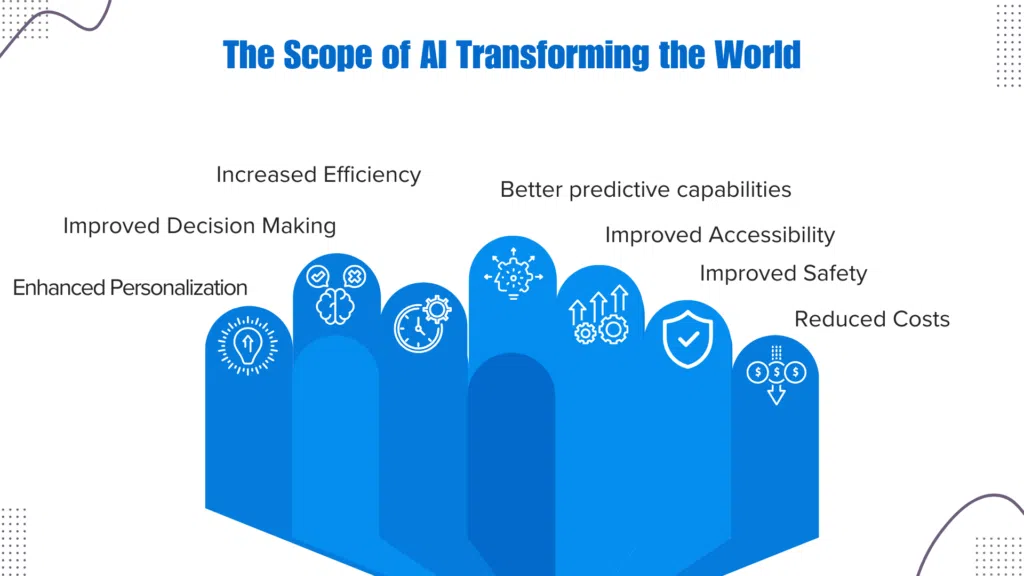How Artificial Intelligence is Transforming the World: Key Impacts, Challenges, and Trends
Effective AI integration demands technical expertise and scalable development. Many organizations turn to IT companies for custom solutions. Savvycom – a leading software development company, a top-tier provider, offers AI-driven services like predictive analytics, mobile app development, and business automation tools. By leveraging software outsourcing in Vietnam, businesses gain access to cost-efficient talent and scalable solutions to meet evolving needs.
This article explores how artificial intelligence is transforming the world, highlighting key trends, challenges, and why companies are turning to outsourcing hubs like Vietnam for a competitive edge.

How Artificial Intelligence is Transforming the World
How Artificial Intelligence is Transforming the World Across Industries
1. Healthcare: Redefining Diagnosis and Treatment with AI
AI is accelerating advances in Healthcare by improving early diagnosis, enabling predictive treatment plans, and personalizing patient care. However, despite these innovations, the deployment of AI in healthcare faces challenges such as data privacy and algorithmic bias. While AI-based diagnostics outperform traditional methods for detecting diseases like breast cancer or retinal conditions, the reliance on patient data raises ethical concerns.
The effectiveness of AI in healthcare is not just about speed or accuracy but about trust. Hospitals and research institutions need to implement stringent data governance frameworks to prevent misuse and maintain patient trust.
IBM Watson, which once promised to revolutionize cancer treatment, encountered setbacks as the complexity of medical data outpaced its early capabilities. It illustrates that even sophisticated AI tools require continuous fine-tuning and domain expertise.
2. Finance: AI-Driven Risk Mitigation and Automated Decision-Making
In the Finance industry, AI enhances fraud detection, automates credit scoring, and personalizes customer service through virtual assistants. However, financial institutions face the challenge of balancing efficiency with accountability. AI models are prone to errors if trained on biased or outdated datasets, leading to risks such as wrongful loan denials or false positives in fraud detection.
While AI reduces operational risks, its transparency and interpretability remain a challenge. Regulatory bodies demand clear explanations for AI-generated decisions – pushing financial firms toward more responsible AI adoption.
For example, JPMorgan’s COiN platform saves 360,000 hours of legal work annually by automating document review. However, these efficiencies also highlight the need for re-skilling employees to transition into higher-value roles.
3. Retail: Transforming Customer Experiences and Supply Chains
Retailers are leveraging AI to create personalized shopping experiences, optimize supply chains, and implement dynamic pricing strategies. While AI-powered recommendation engines increase conversions, they also raise privacy concerns as consumers become wary of how their data is used.
Retailers must tread carefully – balancing AI’s ability to personalize services with consumer demands for data privacy. Regulations like GDPR compel companies to be more transparent in their data collection practices.
Amazon’s AI-driven supply chain optimization enables rapid delivery, setting new standards in e-commerce. However, the push toward AI automation has sparked labor debates about the future of human workers in logistics and Retail.

Source: SDLC Report
Key Trends in AI: Shaping the Future
The future of AI is being defined by trends such as increased automation, real-time processing, and enhanced transparency. As businesses adapt to these shifts, staying ahead in AI adoption will be critical for maintaining relevance in a dynamic digital landscape, and that might be how artificial intelligence is transforming the world.
1. Generative AI: A New Frontier in Creativity
Generative AI tools like ChatGPT and DALL-E are transforming creative industries by producing human-like content across text, image, and video formats. While these tools boost efficiency, they also spark concerns about originality, intellectual property, and misinformation.
Generative AI offers immense potential, but unchecked use could lead to a flood of low-quality content or the spread of deepfakes, making content verification more critical than ever. Businesses will need to adopt ethical guidelines for AI-driven creativity.
2. Edge AI: Intelligence at the Device Level
Unlike traditional AI systems that rely on cloud processing, Edge AI performs computations locally on devices like smartphones, IoT sensors, and self-driving cars. This decentralized approach reduces latency and enhances real-time decision-making.
The challenge with Edge AI lies in maintaining model accuracy and data security at scale. With billions of connected devices generating vast amounts of data, companies must ensure robust security protocols to prevent breaches.
3. AI Governance: Ensuring Ethical and Fair Use
AI systems can perpetuate biases, violate privacy, or make decisions without human oversight – raising ethical concerns. Governments and companies must implement governance frameworks that align AI development with social values.
Responsible AI development is not optional but essential. Regulators worldwide are introducing AI-specific laws, and organizations must integrate fairness, transparency, and accountability into their systems to avoid reputational damage.
Get in touch with Savvycom for a free consultation. We’ll help you decide on next steps, explain how the development process is organized, and provide you with a free project estimate.
Challenges in AI Adoption: A Deeper Dive
These challenges illustrate that while AI offers transformative potential, it requires careful management to ensure ethical, fair, and sustainable use.
1. Data Privacy and Security Risks
AI systems require large volumes of data, which increases the risk of data breaches and misuse. Sensitive data, such as healthcare records or financial information, must be stored and processed securely. Organizations face the dual challenge of complying with global regulations, such as the General Data Protection Regulation (GDPR) in Europe, California’s CCPA, and emerging frameworks in other regions, while also building consumer trust.
- Specific Example: Facebook’s Cambridge Analytica scandal revealed how improperly handled data could be exploited for political influence. This incident accelerated calls for stricter regulations and transparency in AI data usage.
- Challenge: Encrypting datasets and anonymizing information helps mitigate risks, but businesses must also balance data usability with privacy. Companies that outsource AI development to software outsourcing hubs like Vietnam must ensure third-party providers comply with privacy standards.
2. Bias in Algorithms
AI models often reflect biases in the datasets they are trained on, leading to unintended discriminatory outcomes. This is particularly concerning in high-stakes areas like hiring, loan approvals, and law enforcement. For example, predictive policing systems have been criticized for disproportionately targeting marginalized communities.
- Specific Example: Amazon abandoned its AI recruitment tool after it was found to discriminate against female candidates – a direct result of training the system on biased historical hiring data.
- Mitigation Strategies: Companies need robust practices for monitoring and auditing algorithms continuously. Techniques like algorithmic fairness assessments and introducing diverse datasets can help ensure more balanced outcomes.
3. Workforce Displacement and Reskilling
AI-driven automation streamlines repetitive tasks, but it also disrupts employment in sectors like manufacturing, customer service, and finance. Jobs such as data entry clerks and assembly-line workers are at risk of becoming obsolete. However, AI creates new opportunities in data science, software engineering, and AI ethics – but these roles demand advanced skills.
- Specific Example: In the banking sector, chatbots and robotic process automation (RPA) have replaced thousands of customer support jobs, requiring affected workers to transition to new roles.
- Solution: To remain competitive, organizations need to invest in upskilling and reskilling programs. Governments and businesses must collaborate to ensure that workers have access to education in AI-related technologies.
By leveraging AI to turn challenges into opportunities, AI can empower every business, watch this video for more detail:
Case Studies: How Artificial Intelligence is Transforming the World
1. Tesla: Self-Driving Cars and AI Innovation
Tesla’s autonomous vehicles leverage computer vision, neural networks, and real-time data analysis. While Tesla leads the race toward fully autonomous driving, it faces regulatory and safety challenges. Several high-profile accidents involving Tesla’s autopilot system have drawn regulatory scrutiny, underscoring the complexities of balancing innovation with safety.
2. Netflix: AI-Driven Content Personalization
Netflix uses AI algorithms to recommend content based on individual viewing habits, helping the platform achieve high user engagement. However, this personalization has raised concerns about algorithmic transparency – as users often remain unaware of how recommendations are curated. This can lead to filter bubbles, where users are only exposed to content aligned with past preferences.
Google’s DeepMind in Healthcare
DeepMind’s AI-powered solutions have demonstrated potential in early disease detection. For example, its algorithms have been used to predict eye conditions and improve kidney disease diagnostics. However, the project faced public backlash when it was revealed that patient data from the UK’s National Health Service (NHS) was used without proper consent, highlighting the need for rigorous oversight in healthcare AI.
FAQs: How Artificial Intelligence is Transforming the World
What are the biggest risks of AI adoption, and how can companies mitigate them?
The key risks include data privacy breaches, bias in algorithms, and workforce displacement. Companies can address these by adopting robust data protection policies, ensuring compliance with regulations like GDPR. Implementing regular AI audits can help mitigate bias, while reskilling programs can prepare employees for AI-enhanced roles, balancing automation with job retention.
How can organizations ensure that AI models are free from bias?
Bias occurs when AI algorithms rely on incomplete or unbalanced datasets. To reduce this risk, companies must ensure diverse data collection and implement bias detection tools during model development. Regular monitoring and testing, along with a culture of transparency, are essential to avoid discrimination in AI-powered decisions, such as recruitment or loan approvals.
How does outsourcing AI projects improve efficiency?
Outsourcing AI development provides access to global talent pools and reduces operational costs. Companies working with a software development company like Savvycom can leverage AI expertise quickly, without extensive in-house hiring. Outsourcing also offers the flexibility to scale projects according to market demands and integrate emerging technologies faster.
What is the impact of AI on the job market - will it eliminate more jobs than it creates?
While AI-driven automation may displace roles in manufacturing, finance, and customer service, it will also generate new opportunities in fields such as data science, AI ethics, and robotics engineering. However, the shift will require significant investments in reskilling programs and a focus on lifelong learning to prepare the workforce for future job demands.
How do software development companies contribute to responsible AI implementation?
Software development companies play a critical role by integrating ethical AI frameworks and governance protocols into solutions. For example, Savvycom offers predictive analytics, automation tools, and mobile app development, aligning with business goals while prioritizing responsible AI. They also ensure that solutions adhere to data security regulations, reducing risks while maximizing AI’s potential.
Conclusion: Transform Your Business with AI and Savvycom
So, how artificial intelligence is transforming the world? AI is no longer a distant concept – it is actively reshaping the way businesses operate, improving productivity, and enhancing customer interactions. However, how artificial intelligence is transforming the world is not without its challenges. As businesses adopt AI, they must address concerns around data privacy, algorithmic bias, and workforce transition.
Savvycom, a top-tier software development company, offers tailored AI solutions that align with your business objectives. By leveraging software outsourcing Vietnam, companies can implement AI seamlessly and cost-effectively. Contact us to explore how we can help you embrace AI and unlock new growth opportunities.
How Artificial Intelligence is Transforming the World How Artificial Intelligence is Transforming the World
Tech Consulting, End-to-End Product Development, Cloud & DevOps Service! Since 2009, Savvycom has been harnessing digital technologies for the benefit of businesses, mid and large enterprises, and startups across the variety of industries. We can help you to build high-quality software solutions and products as well as deliver a wide range of related professional services.
Savvycom is right where you need. Contact us now for further consultation:
- Phone: +84 24 3202 9222
- Hotline: +1 408 663 8600 (US); +612 8006 1349 (AUS); +84 32 675 2886 (VN)
- Email: [email protected]


